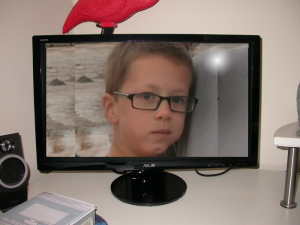I pretty much have to congratulate myself on this one: when my kids were born, I checked off the box that said “Computer module.” I really didn’t quite understand what that would entail, but boy, did I make the right decision!
These days, behavior, morals, even chores—you know what? All of parenting is just not the hassle it’s made out to be! All I have to do is enter my input:
Environment.church {
behavior: reverent;
volume: 10%;
default-position: seated;
thoughts: Jesus;
}
And BAM! My kids are the most reverent at church! (It’s important to beat other people with your reverence, too.)
At home, it’s just as easy:
Operation.chores {
complaining: none;
enthusiasm: 85%;
competence: 100%;
willingness-to-see-it-through: 200%
}
Entitlement? A problem of the past!
Operation.gifts {
response: gratitude-sincere;
attutide: positive;
asking-for-more: please;
if-no: whining-off;
}
Uh . . . YEEEEAH. Right. My kids aren’t computers, and I’m betting neither are yours. For some reason, it’s sometimes hard to remember this, but kids are people. They come with their own preferences and penchants and personalities. Their default settings are the same as any adults’, really:
Default {
selfish: yes;
self-centered: yes;
ungrateful: yes;
minimal-regard-for-others: yes;
}
I kind of think they’re that way by design. The whole job of parents is to teach kids otherwise (hopefully so thoroughly that our defaults as adults aren’t the same!). But it takes a lot more than one line of code to change ingrained, inborn behaviors for a lifetime.
That’s why parenthood is so hard. It doesn’t matter how many times you teach a child to be grateful/not whine/not throw a tantrum because they don’t get something they want, they’ll probably do it again.
THAT DOES NOT MEAN YOU FAILED. It means your child is still a person and probably wants some control over his/her life. It means you have to keep teaching the same lessons you’ve taught a thousand times, probably a thousand more times—basically until your kids grow out of some of the behaviors. (I’m sure there are a few you can legitimately extinguish. Biting, maybe?)
And even then, even adults slip back into these natural-man behaviors. OVERCOMING THESE ID TENDENCIES IS THE BATTLE OF LIFE. I believe one of the major reasons why we came to earth is to learn to control our bodies, our urges, ourselves.
It starts in childhood with external instruction from our parents, but it never, ever ends. Neither does the battle of parenthood.
We will teach our children the same things over and over and over again. And they’ll still not learn it, or they’ll still act up, or they’ll still be people.
But you know what? That’s okay. Because I didn’t sign up for computers. I signed up for kids.
What do you think? Are your kids computers? Are you glad? Why?
Computer monitor photo by Brian/David



 And what sort of respect and admiration do you expect to get when the ones to benefit from the choice you made are your immediate family, as compared to someone whose choices benefit many hundreds of people? In other words, if your choice is to be a full-time mother, you can expect to receive the respect and admiration of your family because they are the ones who benefit, but why would you expect to receive any acknowledgement from other people who gain nothing from your choice? If your choice is to be an astronaut, you can expect to receive the respect and admiration of everyone whose life your work touches.
And what sort of respect and admiration do you expect to get when the ones to benefit from the choice you made are your immediate family, as compared to someone whose choices benefit many hundreds of people? In other words, if your choice is to be a full-time mother, you can expect to receive the respect and admiration of your family because they are the ones who benefit, but why would you expect to receive any acknowledgement from other people who gain nothing from your choice? If your choice is to be an astronaut, you can expect to receive the respect and admiration of everyone whose life your work touches.
 Or, as
Or, as  There’s no way around it: motherhood—maintaining the home, providing meals, rearing children to become productive adults, sometimes even providing income for the family—is hard work. Even if we do just enough to get by, sometimes the work of motherhood is emotionally and physically exhausting.
There’s no way around it: motherhood—maintaining the home, providing meals, rearing children to become productive adults, sometimes even providing income for the family—is hard work. Even if we do just enough to get by, sometimes the work of motherhood is emotionally and physically exhausting.